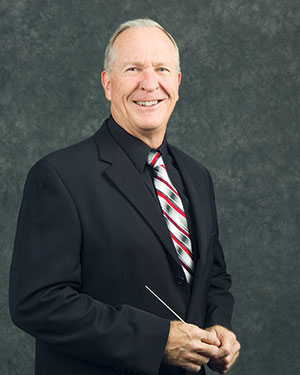 In 2018 Joe Trusty was elected to the school board of the Cabot (Arkansas) School District, where he was Director of Bands for 33 years before retiring in 2017. He is a graduate of Arkansas Tech University and has a master’s degree in educational leadership from the University of Central Arkansas.
In 2018 Joe Trusty was elected to the school board of the Cabot (Arkansas) School District, where he was Director of Bands for 33 years before retiring in 2017. He is a graduate of Arkansas Tech University and has a master’s degree in educational leadership from the University of Central Arkansas.
What steps are involved in becoming a school board member in Arkansas?
The first step is to notify the school superintendent that you are running for a position in your local school district. The central office will then typically do most of the work for you by notifying the county clerk’s office and making sure you know what to expect. You must be a resident in the district in which you are running. You must also make sure you are eligible. For example, if school board members are elected from specific zones, you must live in that zone. Zone representation typically only happens in a larger city or under other special circumstances such as certain percentages of minority populations.
How did the election process work?
I had to get signatures of 20 registered voters from my district turned in by a certain date, then wait for the end of the filing period to see if anyone else was running as well. If you are uncontested like I was, you have nothing else to do except wait on the election. You must have at least one vote. Ironically, my wife didn’t vote for me. She thought she didn’t have to since I was unopposed. If someone else is running, it is then up to you to decide if you will campaign by putting up yard signs, buying ads in the paper, or speaking to civic groups.
If you win the election, the county judge will swear you in at your first meeting. Also, there is a financial history document you have to fill out to make sure you haven’t violated any election laws and that you are legal in your financial dealings.
Are you provided with any training?
A new school board member must receive nine training hours by the end of the calendar year following their initial election. Every year after that, school board members must obtain six training hours. The Arkansas School Board Association hosts most of the in-service opportunities in Arkansas. There are other opportunities on a regional and national level to get your hours. If you fail to get the required hours, you will be notified that you have six months to resolve the problem. If you fail to do that then you will, by law, be removed from the school board.
What made you decide to run for a school board position?
I invested almost all of my 34-year teaching career in my current school district. I saw the band program grow from just over 200 students when I started to almost 900 when I retired. My primary motivation, to be honest, was to protect what I spent my life building. However, now that I am entering the third year of my five-year term, I realize being on the school board is so much more. There are many opportunities to help teachers, students, and district employees. My heart has always been about helping my students, and now every student in the district is mine. I also have a unique perspective as a 34-year classroom teacher to help make sure teachers are supported and given the resources they need to be able to teach successfully.
What were some of the reactions you received when you informed family, friends, and colleagues that you were running for a position on the school board?
Actually, the craziest reaction came from me. When a friend first suggested the idea, the thought of running for the school board had never entered my mind as something to do after I retired. I only decided to run after much deliberation and discussion with my wife. Everyone I told thought I was crazy, but they also thought that it was a good idea. I received much encouragement from my teacher friends and others in the education arena.
Did your former teaching colleagues treat you differently after your election?
In all honesty, yes. All educators have, for whatever reason, a little bit of built-in fear of school board members and upper administration. So the first big difference I noticed was how a few of my fellow teachers would interact with me until they realized that nothing had really changed except my title and my role. I have worked hard to keep myself available to teachers and employees of the district because I already knew so many of them and the role they play in our district. After a few months, most of my relationships returned to normal, but there is still an undercurrent of “you know, he’s on the board now.”
What is the most enjoyable aspect of being a school board member?
The most enjoyable aspect of being a school board member is seeing the success of our district, students, and staff. I serve in an outstanding school district and see improvement in almost all aspects of our district. We start almost every board meeting during the school year with some sort of student/teacher recognition. From spelling bee winners to National Merit Finalists to Backpacks for Kids, there are many successes to celebrate. Obviously, time does not allow for every program to be recognized, but it amazes me how much the board members know about what is happening in our district. Our superintendent does an incredible job of keeping us informed of the good and bad things that happen on almost a daily basis.
What is the most unpleasant aspect of being a school board member?
There are a couple of things that are unpleasant. The first is having to deal with personnel concerns, especially when the employee involved has done something that violates a district policy. You must be careful when dealing with such matters because of the Fair Dismissal Act for teachers. Thankfully, this doesn’t happen often.
I don’t enjoy it when a student discipline issue makes it to the board. By the time it reaches the board, it has become very serious and many times involves expulsion or placement in alternative programs. Some of those decisions are difficult. One of the things I’m most proud of is the fact our board takes these things seriously and is truly concerned about the students involved and how our decisions will impact them. Many times, school policy dictates what must happen, but that doesn’t make it any easier.
Explain the basic dynamic between a school board and the superintendent. How can understanding this help band directors?
The local school board has the right to hire or fire a superintendent. This really shapes the dynamic because ultimately, the school board is sort of the boss to the superintendent. However, the board places a lot of trust in the superintendent since that person oversees the entire district. Everything from overseeing personnel, finance, upholding local, state and federal policies, buildings and grounds, and buses and bus routes fall under the job description of the superintendent. In most districts, there are multiple levels of administrators who take care of those issues, but it is ultimately the superintendent’s responsibility.
One of the best things a band director can do is develop the strongest program, so it, the school, and the district look good. Developing good community relationships, handling financial and disciplinary matters well, and keeping your administration informed about what is going on can really help you stay on the good side of your superintendent. Also, developing an open line of communication with your parents will help. Unfortunately, when things are not clear or not going well, many parents just go straight to the superintendent without checking with the director first. While you cannot prevent that, you can help if you keep parents informed.
A well-informed board receives a large volume of information. The superintendent is the key to this important line of communication. The more information this person shares with the board, the easier it is to make the correct decision. By keeping your superintendent informed about your program, the board has a better chance of being informed as well. In many districts, there are board members who don’t understand what the purpose of a music program is. If they see events supported by musical groups, they assume everything is fine. They rarely comprehend the amount of money it takes to properly fund a music program or the amount of time and personnel that must be allotted to have a successful program.
Ironically, band directors assume many duties similar to a superintendent. Obviously, band directors don’t hire other teachers, but from an organizational and financial perspective, you do a lot of the same things on a much smaller scale. Once you start realizing that, it can give you a better perspective of how difficult a superintendent’s job really is.
What misguided beliefs did you have about school boards before you became a member?
For some reason, I was always nervous about making presentations to the board. I thought if I didn’t present myself well, they wouldn’t support my program. In my district, nothing could be further from the truth. The board members I serve with are truly interested in making sure every program and every student has the opportunity to reach maximum potential.
I also wrongly believed the school board could just vote to fire someone. When it comes to firing teachers, state law dictates how that must be done, and band directors are teachers. There are several items that must be completed in this process, then the superintendent must make a termination recommendation, and the board will vote to approve or deny the recommendation.
What can band directors do to have a positive effect on school board members and their decisions that affect the band?
Again, it all starts with the superintendent. I would suggest presenting a state-of-the-band document to the superintendent each year, or maybe even twice a year. This could be done in a one-on-one visit or maybe even by email. Make sure to list successes, include number of students participating, and how facilities and your budget affect your program. If presented in a positive light, most superintendents will at least become more aware of your program. There will always be a few who say they don’t want that information. If that is your district, maybe it is time to find somewhere else to work.
Once your superintendent is aware of your program, this person should start reporting what they know to the board. If you know one of the board members really well, you might share this information with them as well. When a board member brings up something to the superintendent, that subject suddenly becomes more of a priority to the superintendent.
I also caution you not to contact your board anytime things don’t go the way you think they should. You don’t want to cry wolf. Board members are bombarded by district patrons who are unhappy with things going on, so use that sort of contact carefully. Obviously, if there is something serious that they need to be aware of, let them know, but using the board to get something you want is a dangerous game to play. The board can put a lot of pressure on the superintendent to make things happen, but that ploy can change your relationship with the superintendent, which might come back to bite you at some point in the future. In my 34-year career, I only had to contact board members one time and it concerned significant schedule changes that would have decimated my program. After visiting with several board members and sharing data that showed how the program would be negatively affected, the issue was defeated.
Is there a division of labor on the school board? Are any members paid?
There is not really a division of labor, but there must be a president, vice president, and secretary. All board members are assigned to multiple committees dealing with such topics as curriculum, building and grounds, or transportation. Committees bring information to the full board when needed. We are also assigned to several of the campuses in the district and encouraged to visit them as much as possible during the school year. None of the positions are paid.
What do you see as important qualities for a school board member to have?
The most important quality is a passion for students and teachers to be the best they can be. This passion drives everything we do. Board members must also be willing to make themselves available. You have to be ready for discussions in the aisle at Walmart and for the phone calls that you will receive. However, it is not the board’s job to micromanage the district or its employees. One of the things I admire most about our superintendent is that if we hear from a shareholder with a concern or problem, he wants to be notified as soon as possible, and then he reaches out to that person to see if he can help resolve the matter.
What seems to be the biggest challenge school districts (and school boards) face each year?
There are many critical issues in school districts. Funding is almost always a primary concern. There is not, unfortunately, an unlimited source of funds for education. Unfunded or underfunded state and federal mandates make things difficult. Our state does a lot of good things for education, but often a mandate is passed without the funding to put it in place. Then it must become a priority of the local district to figure out where that money is going to come from.
Each year an increasing number of students comes to school with serious needs that often have nothing to do with education. We must do all we can to meet those needs so we can educate them. Our board voted this year to provide free breakfast to all students regardless of income level, so at least we know students are not hungry to start the day.
Finding great teachers and employees is another difficulty. To find great teachers and staff, you must be willing to support them. That involves such factors as salary, equipment, and building support. Trying to provide a safe learning and work environment is one of the critical areas that we focus on as a school board.
Do you plan on running for a school board position again? Why or why not?
I have not made up my mind about running again. In the first year of my term, the answer would have been no, but now I see how the board, with the leadership of a strong superintendent, can do much good for district students and staff.






